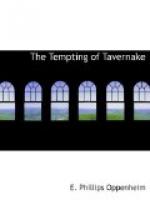Pritchard held out his hand.
“You’re a queer sort, Tavernake,” he declared. “You take life plaguy seriously. I only hope you ’ll get all out of it you expect to. So long!”
Tavernake opened the window after his visitor had gone, and leaned out for some few minutes, letting the fresh air into the close, stifling room. Then he went upstairs, bathed and changed his clothes, made some pretense at breakfast, went through his letters with methodical exactness. At eleven o’clock he set out upon his pilgrimage.
CHAPTER XXVII
TAVERNAKE CHOOSES
Tavernake was kept waiting in the hall of the Milan Court for at least half an hour before Elizabeth was prepared to see him. He wandered aimlessly about watching the people come and go, looking out into the flower-hung courtyard, curiously unconscious of himself and of his errand, unable to concentrate his thoughts for a moment, yet filled all the time with the dull and uneasy sensation of one who moves in a dream. Every now and then he heard scraps of conversation from the servants and passers-by, referring to the last night’s incident. He picked up a paper but threw it down after only a casual glance at the paragraph. He saw enough to convince him that for the present, at any rate, Elizabeth seemed assured of a certain amount of sympathy. The career of poor Wenham Gardner was set down in black and white, with little extenuation, little mercy. His misdeeds in Paris, his career in New York, spoke for themselves. He was quoted as a type, a decadent of the most debauched instincts, to whom crime was a relaxation and vice a habit. Tavernake would read no more. He might have been all these things, and yet she had become his wife!
At last came the message for which he was waiting. As usual, her maid met him at the door of her suite and ushered him in. Elizabeth was dressed for the part very simply, with a suggestion even of mourning in her gray gown. She welcomed him with a pathetic smile.
“Once more, my dear friend,” she said, “I have to thank you.”
Her fingers closed upon his and she smiled into his face. Tavernake found himself curiously unresponsive. It was the same smile, and he knew very well that he himself had not changed, yet it seemed as though life itself were in a state of suspense for him.
“You, too, are looking grave this morning, my friend,” she continued. “Oh, how horrible it has all been! Within the last two hours I have had at least five reporters, a gentleman from Scotland Yard, another from the American Ambassador to see me. It is too terrible, of course,” she went on. “Wenham’s people are doing all they can to make it worse. They want to know why we were not together, why he was living in the country and I in town. They are trying to show that he was under restraint there, as if such a thing were possible! Mathers was his own servant— poor Mathers!




